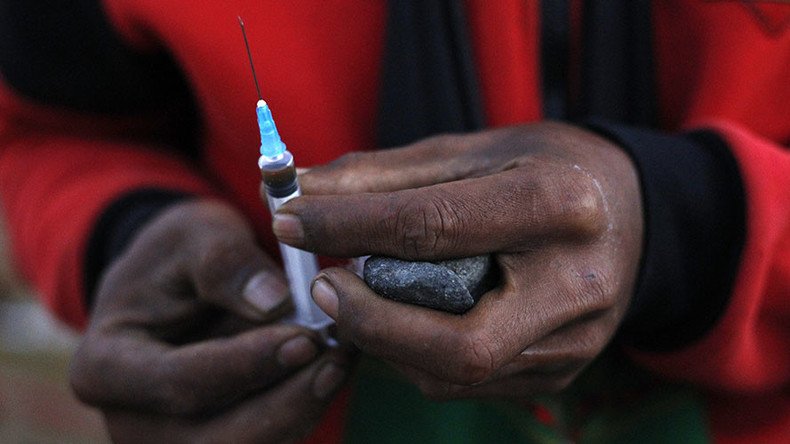Ithaca hopes to become first supervised injection facility in US

An upstate New York politician believes he may have the solution to a current rampant rise in opioid abuse. Ithaca Mayor Svante Myrick has proposed creating a supervised injection site that he thinks could bring addicts to rehab rather than prison.
Following in the footsteps of Canada, Europe, and Australia, Myrick hopes to prevent Ithaca from arresting addicts for shooting up and instead offer them a safe alternative: harm reduction.
“We’ve watched a system, I’ve watched a system, continually act as if this is not a disease,” he said in a statement to the Ithaca Voice, “the way to treat this was incarceration – and I became the head of a system that continued to treat it that way,” adding, “all this sounds radical but then you realize that the drug war itself is a complete failure.”
The proposed site would be more than a sterile place for addicts to do drugs. The report, entitled The Ithaca Plan: A Public Health and Safety Approach to Drugs and Drug Policy, seeks to focus on public health, economic development, as well as harm reduction. The plan also includes community development and expands access to medication assisted treatments, such as those substituting methadone, according to a press release from the Drug Policy Alliance.
Heroin abuse in the US is on the rise, as are deaths resulting from it. The CDC refers to it as an epidemic, saying that use of the drug has more than doubled in the past decade. What’s more is that heroin has one of the highest relapse rates, as high as 80%, according to the New York Daily News.
The surge in opioid addiction has come with a high body count as well. The Centers for Disease Control and Prevention reported that drug overdoses hit record levels in 2014, with over 47,000 deaths. In addition, death by overdose increased by 200 percent from 2000 to 2014, of which Heroin was responsible for 26 percent.
The home of Cornell University, Ithaca is a small town in Upstate New York. An Ivy League school does not make the community immune to opioid addiction, however. Cayuga Addiction Recovery Services has seen a sharp spike in heroin-addicted clients. Between 2007 and 2014, the population of heroin addicts increased by 35%, according to Ithaca.com. In addition, there was a single three week period in 2014 when Ithaca saw three fatal overdoses and 13 non-fatal overdoses, CBS New York reported.
Heroin deaths doubled in US in two years http://t.co/gX2YrFxLiZ
— RT America (@RT_America) October 4, 2014
In an effort to combat the ravages of the epidemic, the Plan envisions the site being staffed by trained doctors and nurses that could intervene if an overdose began to take place. The Plan is modeled after Insite, Vancouver’s supervised injection facility that opened in 2003. According to their research, between December 1st, 2003 and March 2005, 18% of Insite users began a drug detoxification program. In addition, those who used Insite on a weekly basis were 1.7 times more likely to enroll in a detox program than those who visited less frequently.
The heroin epidemic has not gone unnoticed by President Obama, who sought $1.1 billion in funding earlier this year to address opioid and heroin abuse. The current budget for the federal treatment program is $127 million. The majority of the new money will go to states to increase medication-assisted programs and therapy.
$1.1 billion needed to fight opioid addiction – White Househttps://t.co/KnYEmjQgg3pic.twitter.com/H8HSA1wMJs
— RT America (@RT_America) February 3, 2016
Svante Myrick knows the damage that be caused by drug addiction. As the son of a man who abandoned his family, Myrick worked his way from living in a homeless shelter to going to Ithaca’s own Cornell University. Four years ago, he became the youngest mayor of Ithaca at the age of 24, Newsday reports. He plans to ask New York’s Health Department to declare the heroin epidemic a state health crisis in order to enable his plan to move forward without involving the state legislature.
Gwen Wilkinson, Ithaca’s district attorney, initially opposed the plan. However, she has since changed her mind. “What brought me around was the realization that this wouldn’t make it more likely that people will use drugs,” Wilkinson said. “What it would do is make it less likely that people will die in restaurant bathrooms.”












